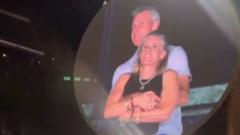Bolsonaro's legal troubles deepen as court imposes strict measures
Brazil's Supreme Court Issues Threat of Imprisonment for Bolsonaro

Brazil's Supreme Court Issues Threat of Imprisonment for Bolsonaro
A justice has warned the former president over social media restrictions
The Brazilian Supreme Court has escalated tensions by threatening to arrest former President Jair Bolsonaro for allegedly violating restrictions placed upon him. Justice Alexandre de Moraes has accused Bolsonaro of breaching a court-imposed ban against his appearance in audio, video, and social media interviews. Moraes has stated that Bolsonaro may face “immediate imprisonment” unless his legal team can justify the ex-president's appearance in a video shared by his son, Eduardo, just days ago.
The developments come amid ongoing trials concerning Bolsonaro's alleged conspiracy to obstruct President Luiz Inácio Lula da Silva’s inauguration, a charge he vehemently denies. Justice Moraes is leading the investigation into Bolsonaro's actions which are said to include “antidemocratic acts.” Last week, the justice set forth stringent restrictions on the former president, including night-time and weekend curfews and continuous monitoring to prevent him from potentially fleeing the jurisdiction while his case is underway.
In addition to these measures, Bolsonaro is prohibited from engaging with foreign governments and must wear an electronic ankle monitor. He is also barred from any contact with his son, who has been advocating against the legal proceedings in the U.S. Bolsonaro has publicly condemned the court's actions, labeling Justice Moraes a "dictator," and insists he has no plans to leave Brazil.
These developments have garnered international attention, particularly from former U.S. President Donald Trump, who has described the legal actions against Bolsonaro as a "witch hunt." Amid rising tensions, Trump has threatened to implement a significant tariff on Brazilian goods, citing Brazil's treatment of Bolsonaro as a catalyst for this decision. In reaction, the Trump administration revoked the U.S. visas of Moraes and other Supreme Court justices, prompting Lula to criticize this as an act of interference in Brazil’s judicial system.
As this complex situation unfolds, the implications for both Bolsonaro and Brazilian-American relations remain uncertain, with both sides intensifying their rhetoric. The trial is expected to draw further scrutiny as more evidence is presented and political alliances are tested in the coming weeks.
The developments come amid ongoing trials concerning Bolsonaro's alleged conspiracy to obstruct President Luiz Inácio Lula da Silva’s inauguration, a charge he vehemently denies. Justice Moraes is leading the investigation into Bolsonaro's actions which are said to include “antidemocratic acts.” Last week, the justice set forth stringent restrictions on the former president, including night-time and weekend curfews and continuous monitoring to prevent him from potentially fleeing the jurisdiction while his case is underway.
In addition to these measures, Bolsonaro is prohibited from engaging with foreign governments and must wear an electronic ankle monitor. He is also barred from any contact with his son, who has been advocating against the legal proceedings in the U.S. Bolsonaro has publicly condemned the court's actions, labeling Justice Moraes a "dictator," and insists he has no plans to leave Brazil.
These developments have garnered international attention, particularly from former U.S. President Donald Trump, who has described the legal actions against Bolsonaro as a "witch hunt." Amid rising tensions, Trump has threatened to implement a significant tariff on Brazilian goods, citing Brazil's treatment of Bolsonaro as a catalyst for this decision. In reaction, the Trump administration revoked the U.S. visas of Moraes and other Supreme Court justices, prompting Lula to criticize this as an act of interference in Brazil’s judicial system.
As this complex situation unfolds, the implications for both Bolsonaro and Brazilian-American relations remain uncertain, with both sides intensifying their rhetoric. The trial is expected to draw further scrutiny as more evidence is presented and political alliances are tested in the coming weeks.





















